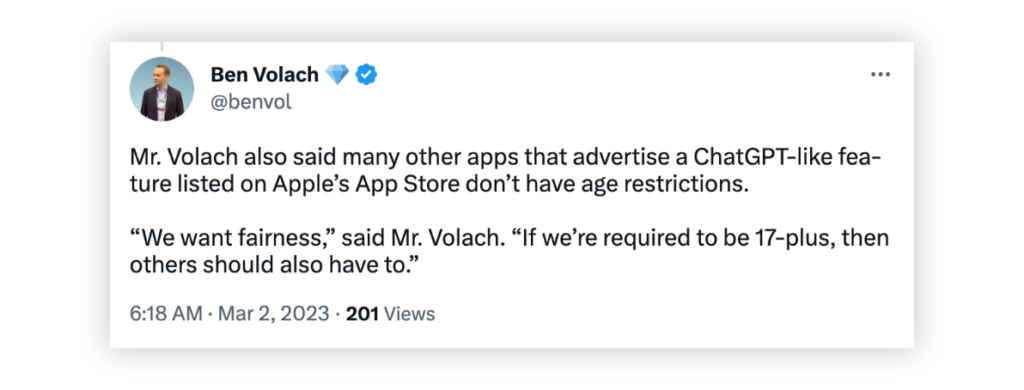Apple’s recent blocking of an email app using OpenAI’s GPT-3 language model has created controversy in the tech world. The app, BlueMail, uses a customized version of the model to generate responses to emails. However, the app’s co-founder, Blix’s Ben Volach, claims that Apple’s treatment of BlueMail is unfair and discriminatory.
According to Volach, Apple has blocked BlueMail’s update and is discriminating against the app, while other apps powered by GPT-3 seem to be unrestricted. Last week, Apple rejected the app’s update and requested that BlueMail revise its age rating or implement content filtering, as the app may produce content not appropriate for all audiences.
Volach tweeted that he wants fairness, and if BlueMail is required to have a 17-plus age rating, other apps should also have the same age restrictions. He also pointed out that many ChatGPT-like apps on Apple’s app store do not have age restrictions.

Apple is looking into the complaint, stating that developers can challenge rejections through the App Review Board process. However, D.A. Davidson analyst Thomas Forte suggests that Apple’s scrutiny of ChatGPT-powered apps is due to concerns about user experience quality, content appropriateness, and service provided by the app.
Microsoft and Alphabet Inc’s Google have announced their own AI chatbots earlier in February. Although AI-powered chatbots are a nascent field, early search results and conversations with AI-powered chatbots have made headlines due to their unpredictability.
The blocking of BlueMail’s update by Apple highlights the need for regulations on AI-powered applications. As AI-powered applications continue to evolve, it is essential to consider the ethical implications of their use and the regulations that should be in place to ensure fair and consistent use. This incident may lead to more scrutiny on AI-powered applications, and developers will need to keep up-to-date with the changing landscape of AI regulations to ensure their applications can be used and updated as intended.
In conclusion, the blocking of BlueMail’s update by Apple has sparked a debate about the regulations that should be in place for AI-powered applications. While Microsoft and Google have also announced their AI chatbots, the field is still in its infancy, and early search results and conversations with AI-powered chatbots have been unpredictable. As AI technology continues to advance, it is vital to consider the ethical implications and regulations that should be in place to ensure fair and consistent use.